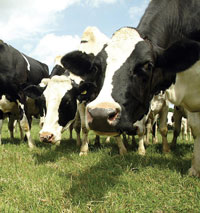Optimistic outlook for dairy sector, despite difficulties, new report says

Dairy farmers should be positive about the long-term prospects for the sector, despite current difficulties and lack of confidence, according to a new report published today (16 February).
The 69-page Dairy UK White Paper (pdf) says rising global population and long-term economic growth will tip the supply and demand balance for dairy products back into the favour of farmers. World demand is predicted to grow 16% between 2008 and 2017 – equivalent to 2% a year. The greatest expansion (2-3% annually) is likely to be in developing economies of India, Africa and Asia, although traditional EU markets will also grow, albeit by a smaller 1% or less annually.
For the UK’s 12,900 dairy farmers, who are more exposed to world supply and demand fluctuations following deregulation, any extra demand will be welcome, but is unlikely to ease the immediate pressures of poor confidence associated with falling milk prices and depressed milk output.
As a result, the report predicts that the downward production trend seen since 2004 will continue, at least in the short-term. “Although times are challenging at the start of 2009, in the longer term the signs are good,” Dairy UK Director General Jim Begg said. “Commercial prospects are strong, with a weak pound helping our exporters and strengthening the domestic market.”
He urged industry commentators to stop ‘doom mongering’ about the prospects and start acting constructively. The UK industry could adapt to changing markets and produce high quality, innovative dairy products, he said – something that will be increasingly important in the future.
“It is our job to ensure that Government recognises the industry’s crucial importance and acts accordingly. We are calling for more balanced regulation, a softer touch on consolidation and more R&D. Government must also take immediate steps to tackle bovine TB effectively, or give industry the tools to do so.”
The White Paper also said the EU was keen to remove market support (despite introducing temporary support measures earlier this year), which would lead to further convergence of UK and world prices and exposure to volatility. It said there would be opportunities for rationalisation and mergers of UK dairy companies as they sought efficiency and it called on the competition authorities not to impede this process.
NFU Scotland milk committee chairman, Willie Lamont welcomed much of the information in the report, but said it had failed to tackle some of the fundamental issues facing producers.
“Dairy farmers confidence is being eroded, not by the lack of foresight to see that the fundamentals of the world dairy markets are positive, but by the continuing lack of support and encouragement from the supply chain. Dairy producers in the UK, despite being amongst the most efficient, receive the lowest prices and the lowest percentage of the end price in Europe,” he said.
“Until the supply chain in general, and the retail sector in particular, acknowledges and rewards the primary producer with a price that allows for a reasonable margin, then the confidence of dairy farmers will remain fragile.”
Do you agree with the report or do you think it misses the key issues? Tell us what you think in the FWi Forums.
Read what FW’s economics and world editor Phil Clarke thinks about the action needed to stop dairy decline in his new Business blog.
White Paper key facts
• Strong long-term demand for dairy products due to increasing world population and incomes
• Downward production trend to continue in short-term
• EU keen to remove market support – greater exposure to world prices and volatility
• Further rationalisation of UK dairy industry likely
• Current downturn in prices is short term phenomenon
• See www.dairyuk.org for more
